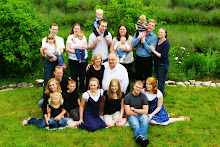As an adult, you probably learned how to deal with your anger. When you're upset at a cashier, you don't yell at him or hit or kick him. The reckless driver who cuts you off might get a angry look from you but you're not likely to crash your own car into him. When your husband doesn't like the dinner you made, you don't throw it across the room. Sometime before you reached adulthood, you learned the skills to act in a socially acceptable manner. And if not, now is the time to learn...quickly!
Now you have kids. How do you teach them to respond to their anger in an appropriate way? There are a few ways that might help.
First, what kind of example do you set when you are mad? How does your husband act when angry? Sometimes the problem lies with the parents and the kids are merely imitating them. If you have a hard time dealing calmly when you are angry (especially at the kids), you need to work on learning calming techniques yourself. We always have to start with ourselves.
When your child is in a good mood, talk with him about what makes him angry. Listen and don't argue with him. You want to hear his perspective. What he has to say might surprise you. He might have a legitimate cause for frustration. If he does, see what you can do to alleviate the problem. Younger siblings often know how to push their older brother or sister's "hot buttons". Sneaky little things :) Some of my kids were extremely adept at knowing exactly what to do to make each other mad!
Tell him that everyone gets angry but some ways of expressing it aren't acceptable and won't be tolerated. These include hurting another person, hurting property, or doing something dangerous.
Work with him to come up with acceptable outlets for anger that you both agree on. You could then make (or have him make) a poster that lists those ideas in a prominent place. They might include taking a deep breath before doing or saying anything, leaving the room to get in control, going outside to get some physical exercise, writing down the angry thoughts, a punching bag (not a sibling :) )... He needs to know that he WILL get mad sometimes but he has to learn how to control himself.
Work with him to come up with consequences for angry outbursts and behavior (again, while he's in a good mood). Having him help come up with consequences makes him part of the decision making process and will increase the likelihood that he will cooperate. Then, follow through when you need to.
Dealing with anger in an appropriate way is not learned overnight. What you want to look for is progress in the right direction. Your child is still just that...a child. He hasn't reached full grown maturity, physically or emotionally. Your job is to set a good example and offer encouragement for his efforts to learn to control himself and apply consequences when he forgets.
Valentine’s Day - Beach Style
4 days ago










0 comments:
Post a Comment